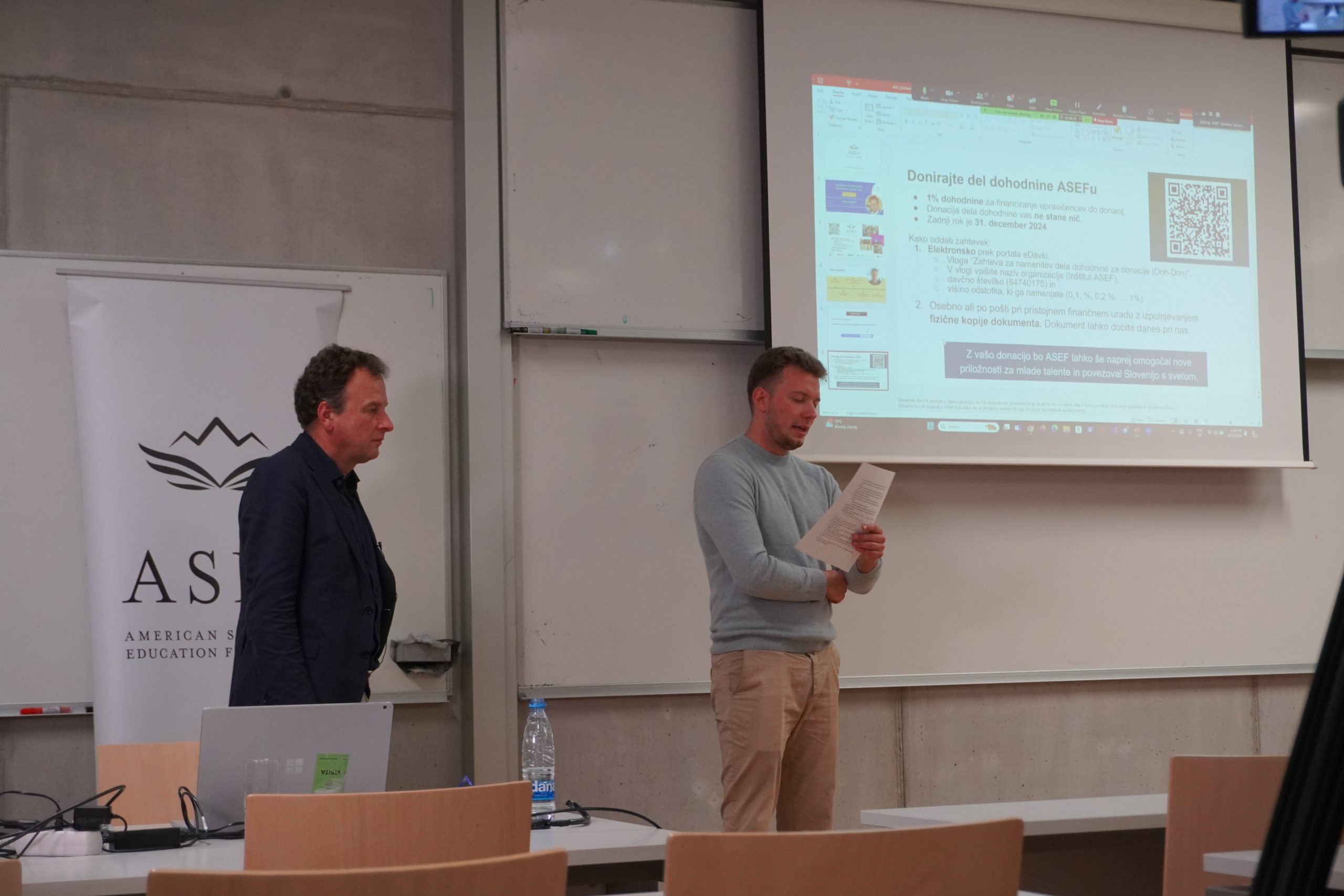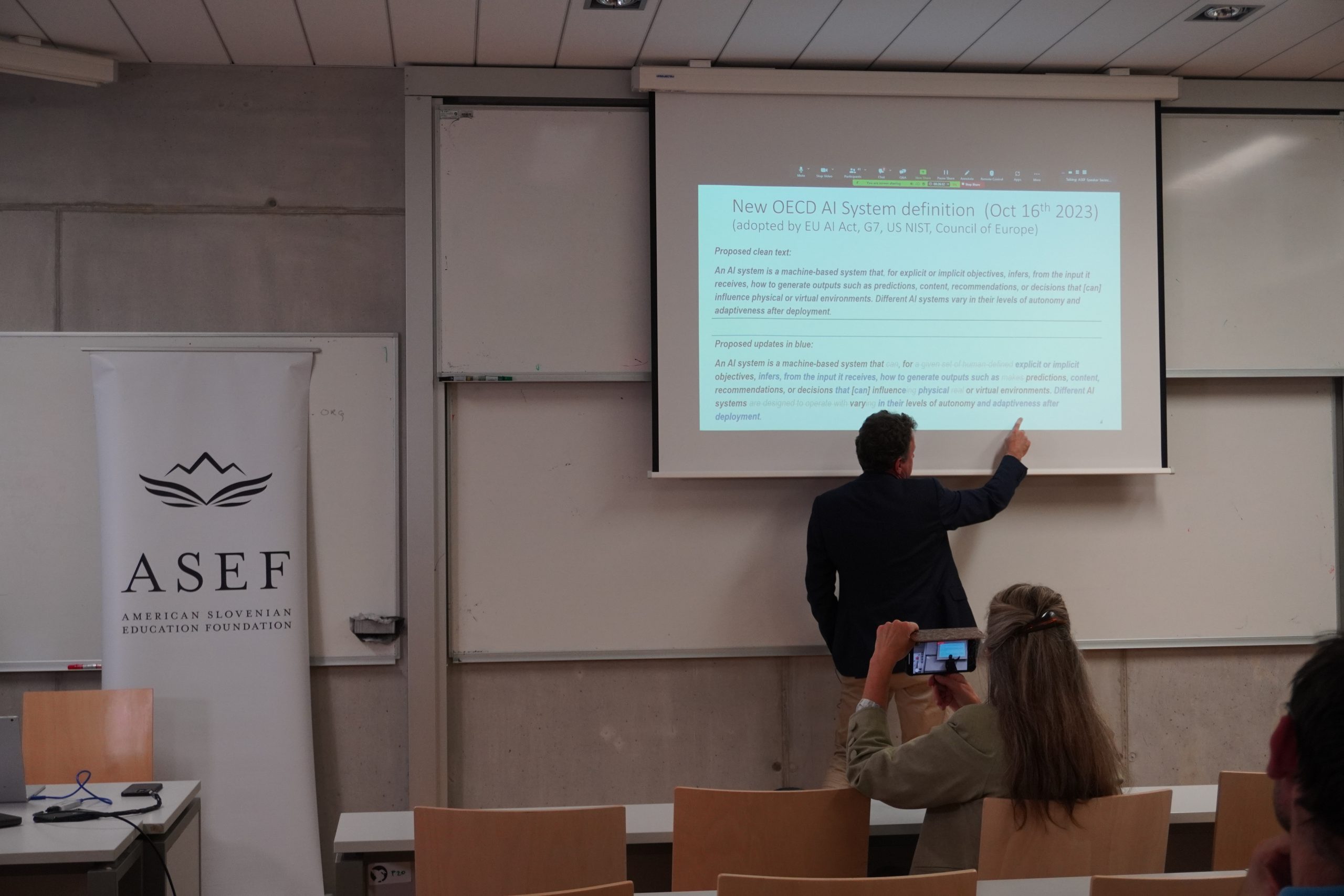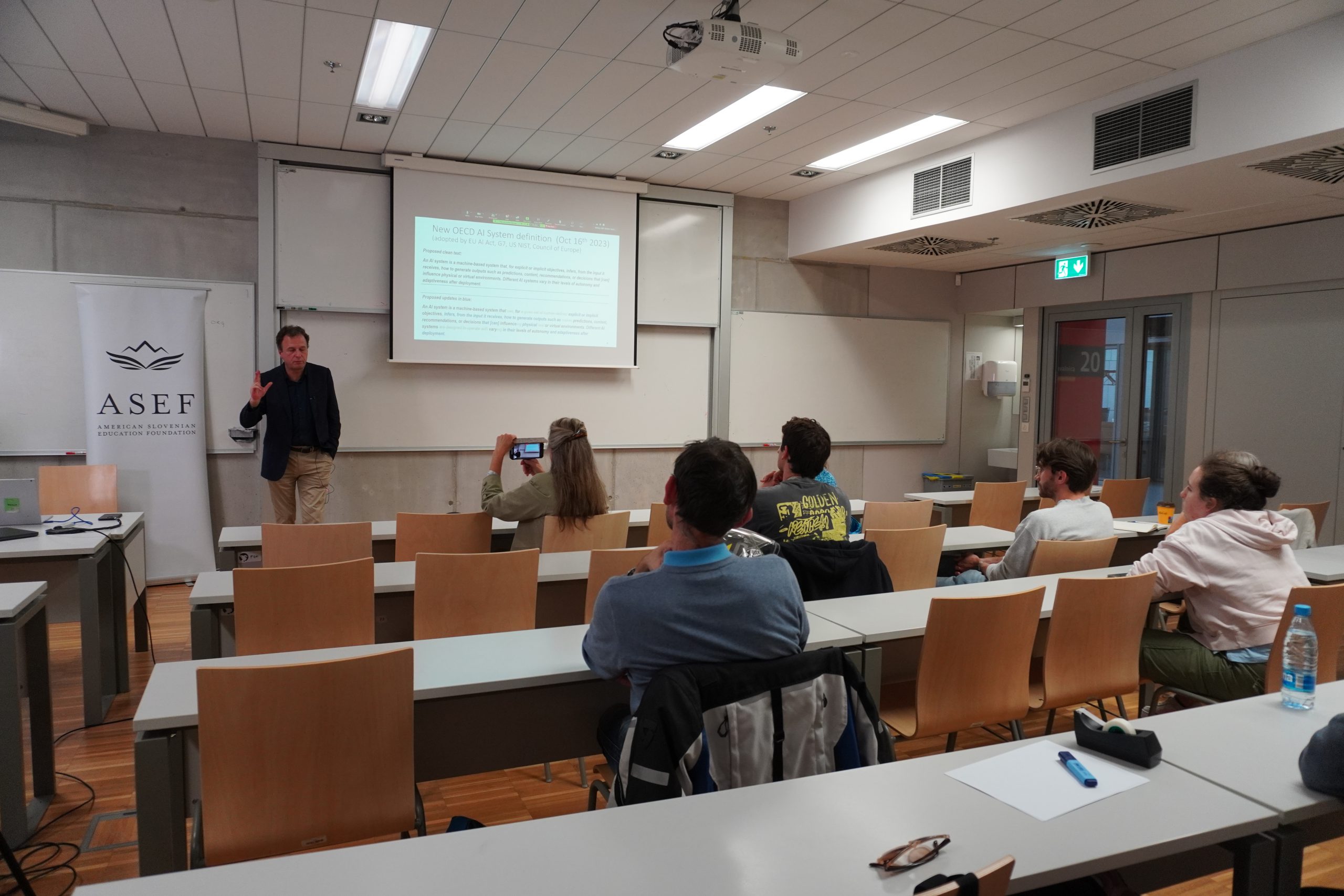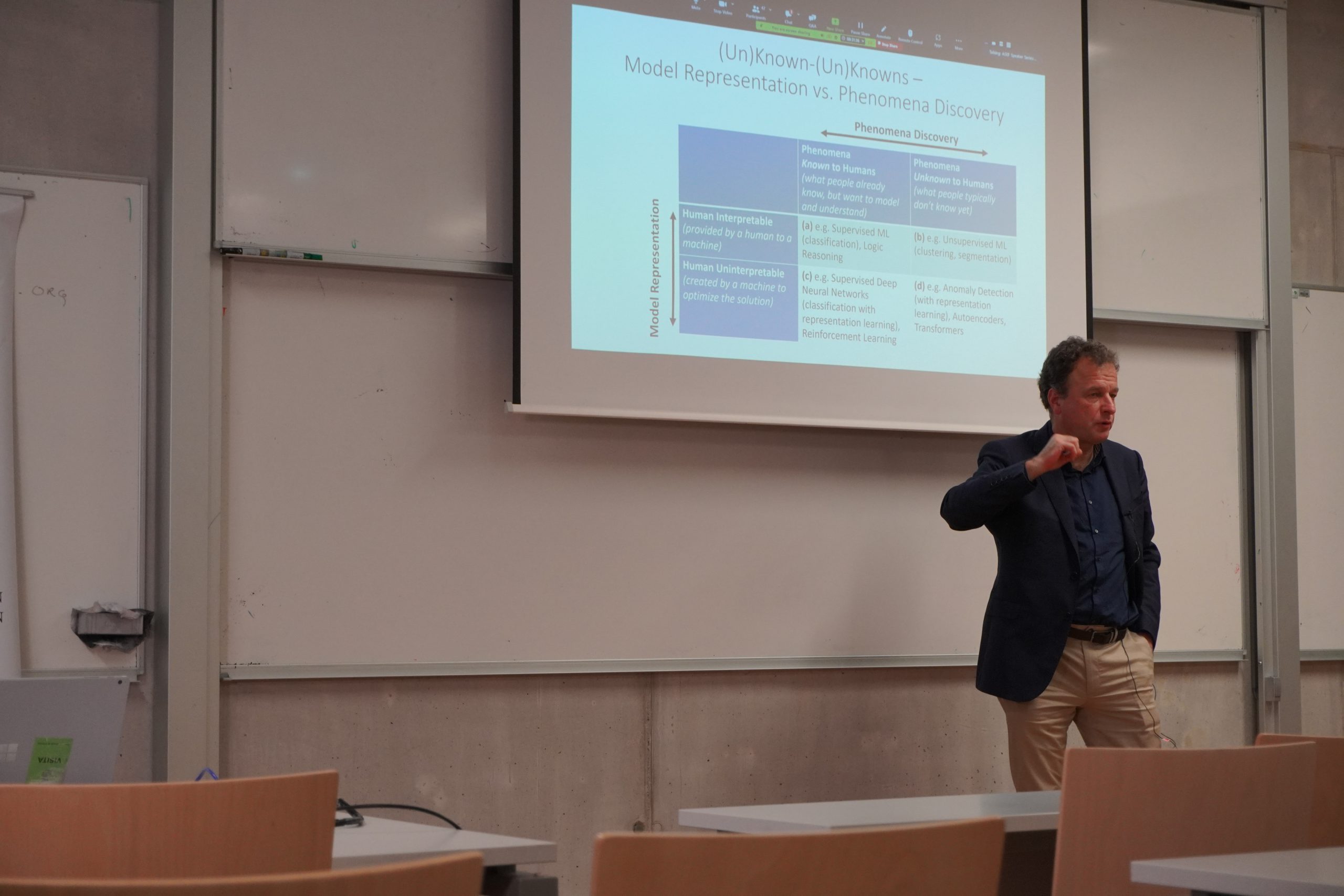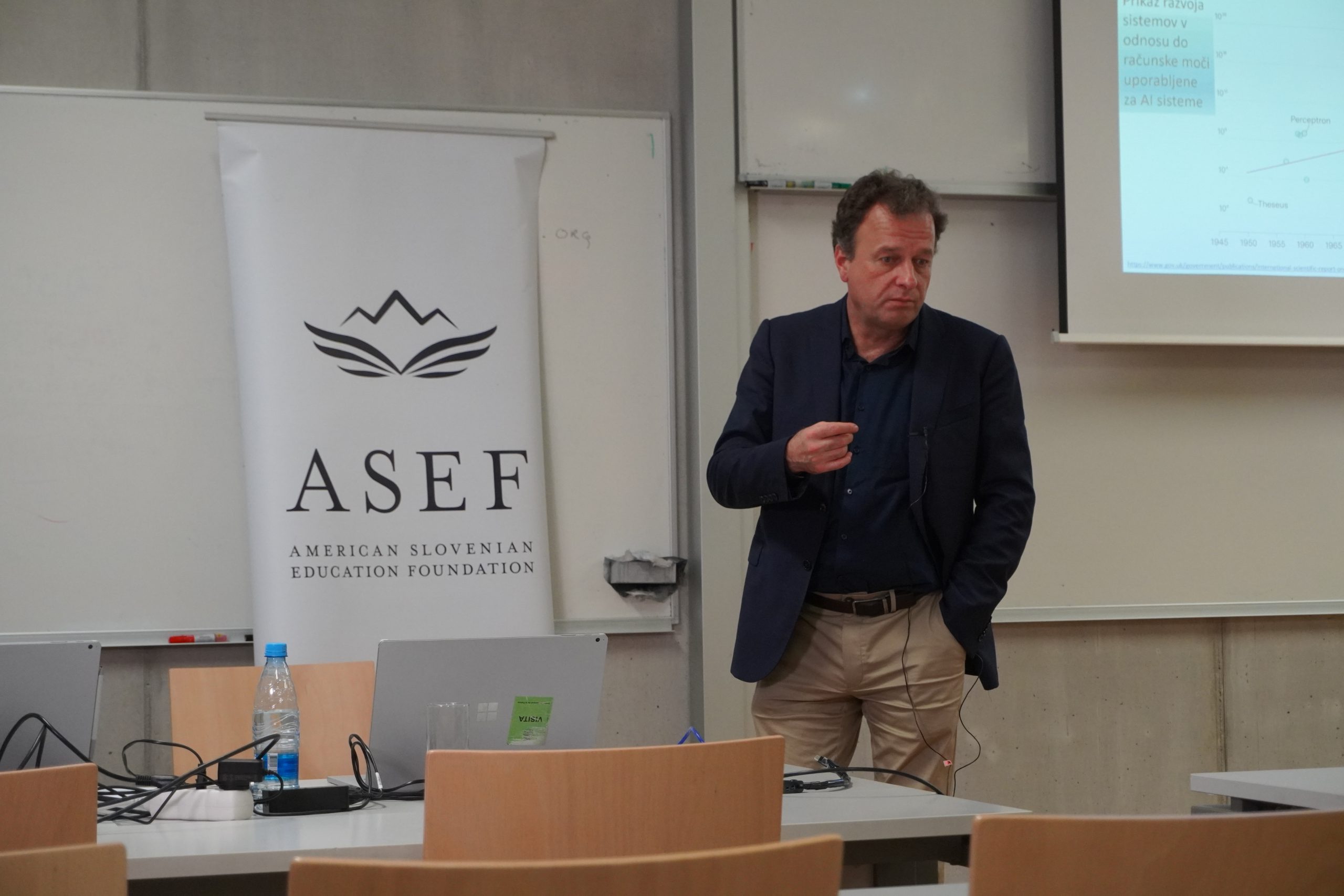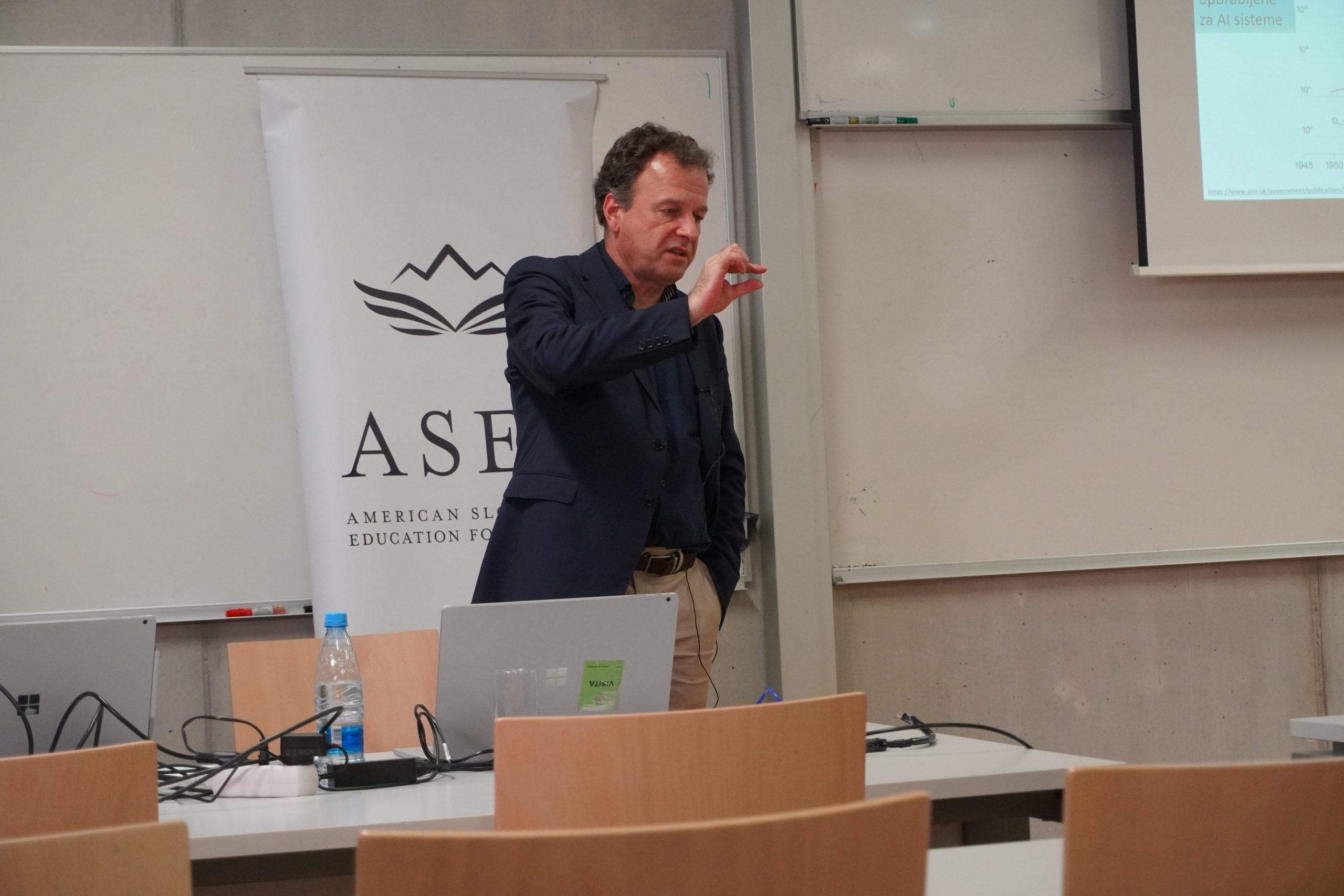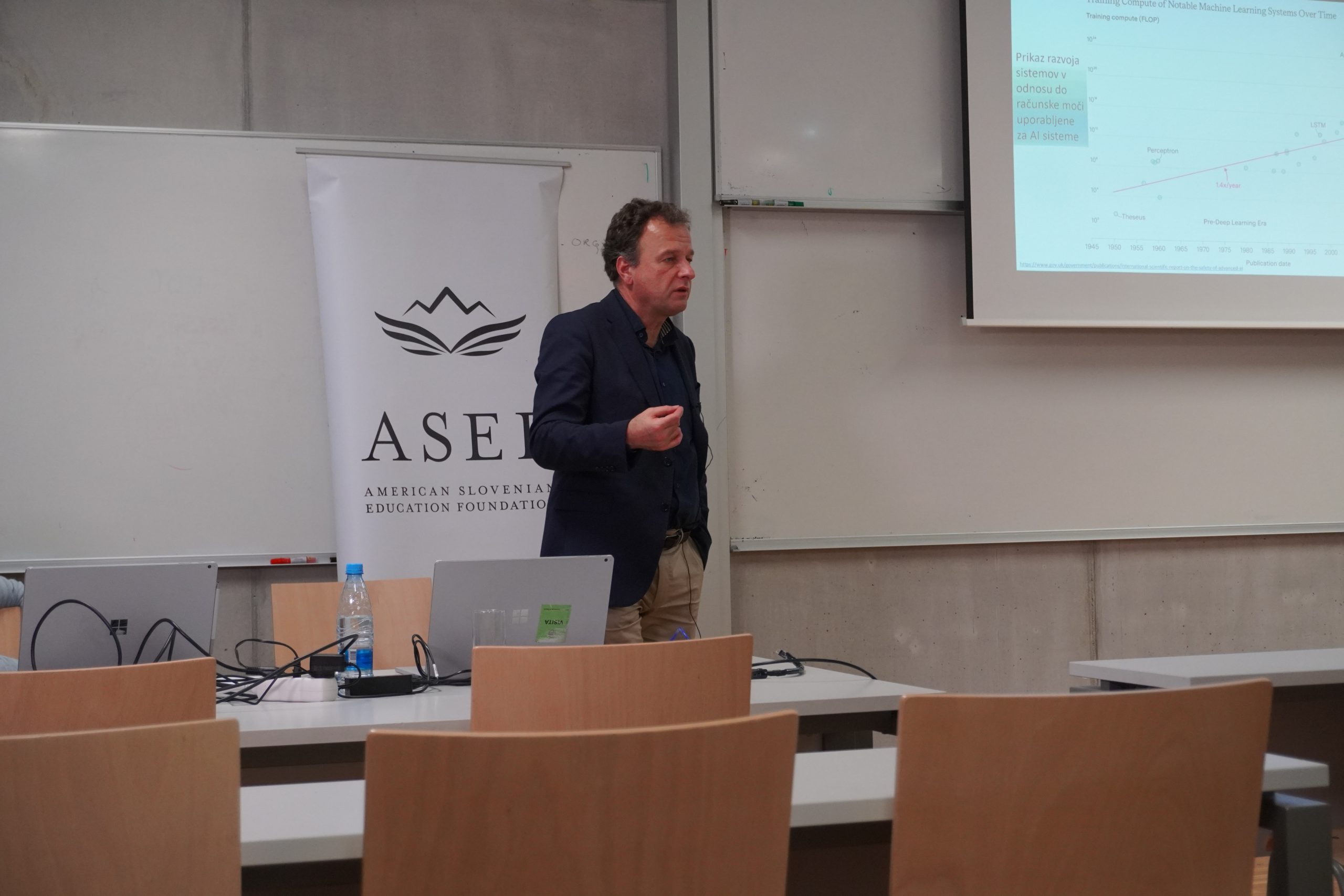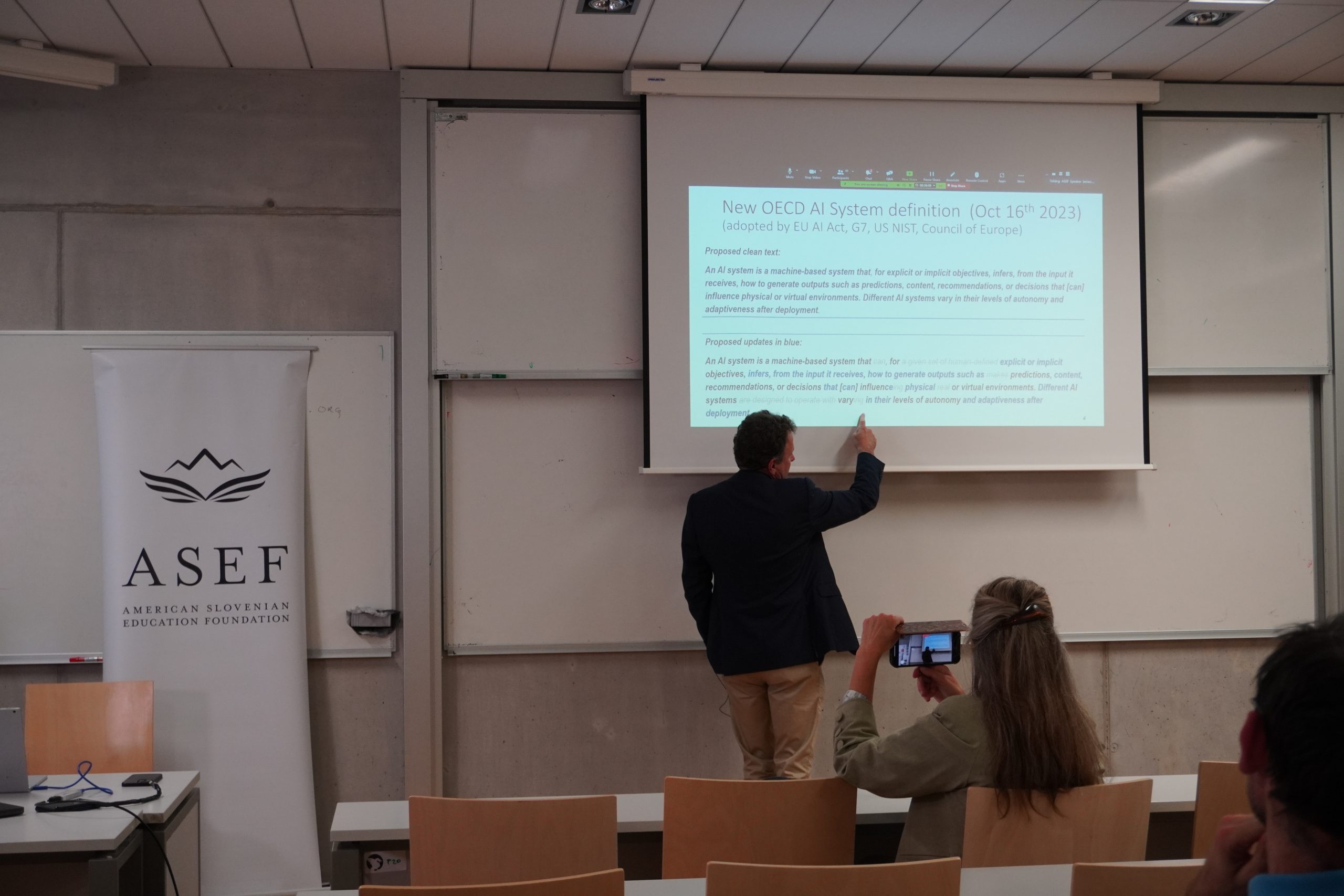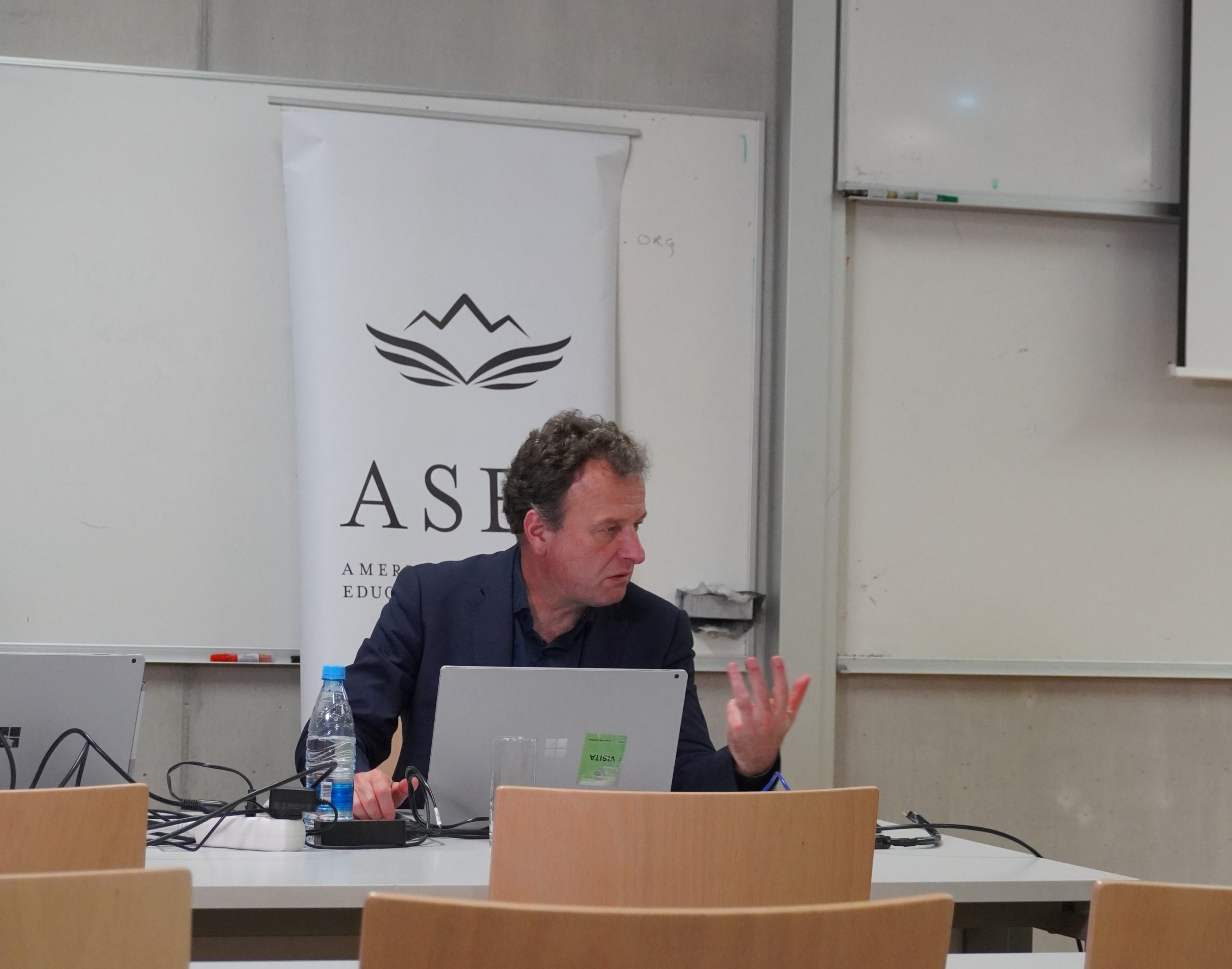
Marko Grobelnik: “The transformation brought about by AI”
On Thursday, May 23rd, we held a popular science lecture at the Faculty of Computer and Information science as part of the ASEF Speaker Series. The lecture, “Transformation brought about by artificial intelligence”, originally titled “Observation of the development of artificial intelligence in real time”, was given by Marko Grobelnik and moderated by ASEF Junior Fellow 2024, Adrian Mladenič Grobelnik.
Marko Grobelnik is a researcher in the field of artificial intelligence (AI), the 2016 Digital Champion of Slovenia, CEO and founder of Quintelligence, co-founder of the UNESCO International Research Center for Artificial Intelligence (IRCAI) and co-head of the artificial intelligence laboratory at the Jožef Stefan Institute.
ABOUT THE LECTURE
The lecture began with a brief modern history of artificial intelligence, focusing on the release of GPT 3.5 in November 2022 and GPT 4 in March 2023. Grobelnik presented the recent rapid development of generative artificial intelligence and touched on the origin of GenAI, the interesting fact that we do not know why it works so well, and the lengthy procedures that led to the official definition of “artificial intelligence”.
In discussing the definition, he addressed the months-long processes of the European Union and the OECD, in which he participated. The current definition has been adopted by the G7, US NIST, the Council of Europe, and is also used in the EU AI Act, the first legislative document aimed at regulating AI:
“An AI system is a machine-based system that, for explicit or implicit objectives, infers, from the input it receives, how to generate outputs such as predictions, content, recommendations, or decisions that can influence physical or virtual environments. Different AI systems vary in their levels of autonomy and adaptiveness after deployment.”
Grobelnik, Perset, Russell; OECD AI Policy Observatory, 2024
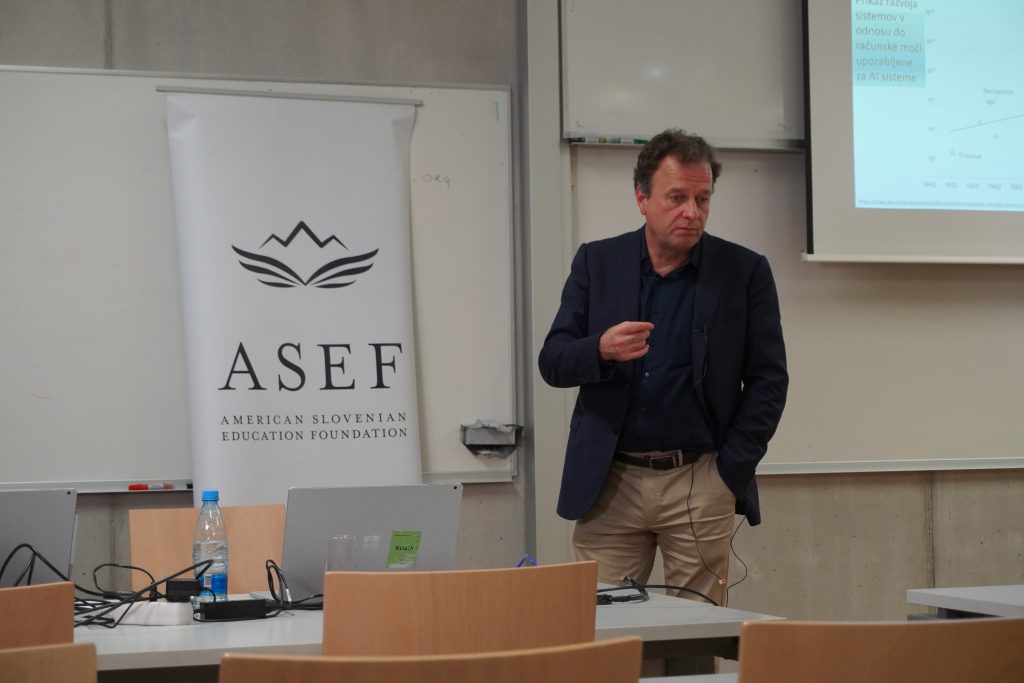
WHAT IS AI CONTRIBUTING?
Following the history of AI, Grobelnik also addressed the important breakthrough in the field of neural networks in 2010 and the path to current development, which has been outlined in the latest International Scientific Report on the Safety of Advanced AI. The report cites a plethora of areas such as computer vision, speech recognition, and handwriting recognition where AI technologies have been evaluated as having surpassed human capabilities.
We also witnessed a wide range of areas into which AI is currently bringing innovation. With technology for text, code, images, video, music, and other content, commercialized innovation is now spanning from marketing tools, to music production, text-to-code conversion, 3D printing integration, speech-to-text, and more. Grobelnik emphasized the speed at which these products are being developed and made publicly available. While discussing this rapid feature of the AI field, he presented the work of the OECD AI Policy Observatory, which aims to observe the development of AI in real time. Their observation covers 12 dimensions, and the operation of the observatory is often described as a “real-time technology watch”.
NEW DEVELOPMENTS AT THE JOŽEF STEFAN INSTITUTE
After interesting presentations of various AI-integrated products – as Grobelnik put it, “playing with innovation” – we moved on to the work of the Department for Artificial Intelligence of the Jožef Stefan Institute. We were able to witness exclusive software which is currently being developed at the Institute. The software manages a database of thousands of articles on current events, on the basis of which it issues a prediction of the socio-political consequences and implications which the analyzed events might bring. Grobelnik demonstrated a rendering of predictions in various areas, from the war in Ukraine, to the current fads of influencer Kim Kardashian.
The equipment is not yet available to the public and is a unique product in the Slovenian AI field. After the lecture, we inquired about when we could expect the program to be accessible for interinstitutional, i.e. research use. The currently predicted release is set for as early as the end of summer 2024, which further proves the speed of AI development in Slovenia. To enable the program’s academic use, the Institute is looking to cooperate with the Faculty of Social Sciences, UL, with the program hopefully becoming widely accessible to researchers.
When asked about the dangers of such technologies in the hands of the public, Grobelnik commented that there is no danger and added “if we don’t do it, someone else will”. He referred to the aspect of intense competition mentioned during the lecture, where research institutions, private corporations and governments worldwide are in a tight race for innovation. Although the first AI regulation act was enacted by the European Union, Grobelnik emphasized that generally, regulation is significantly behind innovation itself, which gives way to various legal issues.
ASKING THE RIGHT QUESTIONS
This topic sparked the interest of our very active audience, who posed multiple questions at the end of the lecture. Several participants mentioned various ethical aspects of AI research and integration, the potentially problematic aspirational naming of the field, and the possible need to limit development. During the rich discussion, participants cited the works of various institutes and world-renowned researchers, including Timnit Gebru, Emily M. Bender, Emily Tucker, and the DAIR Institute and the Center for Privacy & Technology at Georgetown Law.
Grobelnik addressed the environmental questions raised by the audience, regarding which he is not overly concerned, and marked questions about the problematic naming of “artificial intelligence” and the use of anthropomorphizing vocabulary in technology (e.g. “think”, “decide”, “do”) as irrelevant. He also spoke to the participants about the general public’s enthusiasm for AI, which has risen exponentially following the release of GPT 3.5 and GPT 4.0.
After an interesting and informative discussion, it became clear that Slovenia is not only catching up, but perhaps competing with the rest of the world in terms of the development of AI tools and their commercialization, but questions of an ethical nature remained open, including whether the Jožef Stefan Department for Artificial Intelligence will be developing its own department for ethical AI use and development in the near future.
We would like to thank the lecturer and moderator for an extremely interesting and informative event as we look forward to more ethical STEM innovations in Slovenia and worldwide.
The program is co-financed by the Government Office for Slovenians Abroad and the Office of the Republic of Slovenia for Youth.


